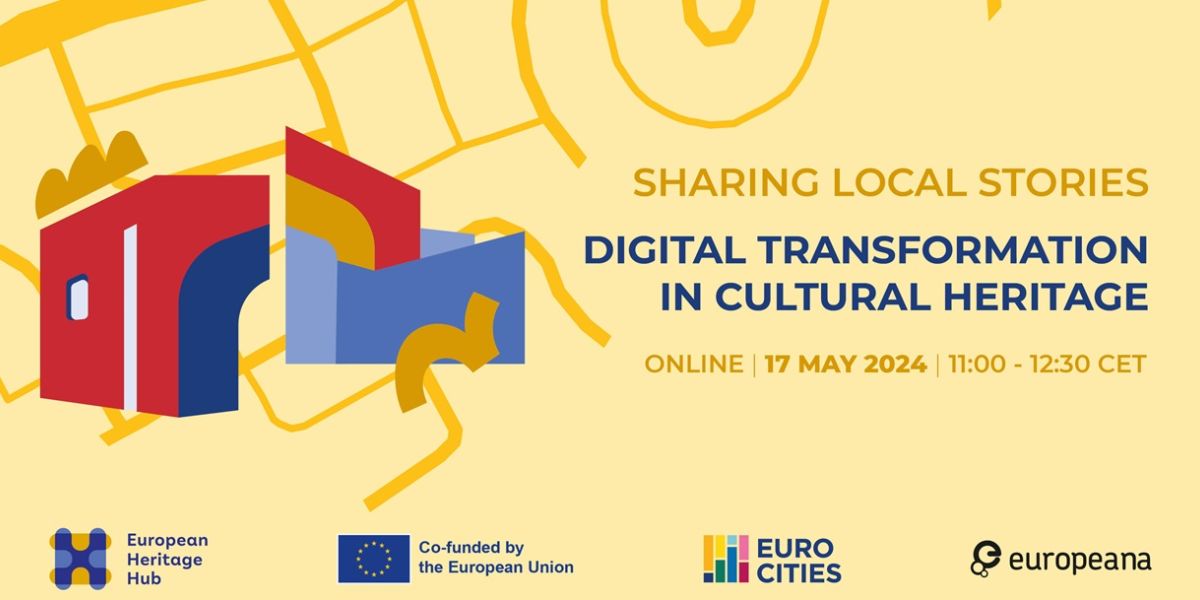Sharing Local Stories: webinar on digital transformation in cultural heritage
This webinar from the Heritage Hub project will focus on the digital aspect of triple transformation – the Hub’s overarching theme – while also highlighting the connection with the social and green dimensions. It is part of a series implemented by Hub project partners Eurocities, Europa Nostra and the Europeana Foundation.
Following an Open Call for Local Good Practices, the European Heritage Hub recently identified exemplary initiatives in the cultural heritage field that contribute to the green, digital, and social transformation of society. The Sharing Local Stories series of four thematic webinars will share how these practices have been implemented on local and regional levels. In collaboration with partners of the Hub and participants from the open call, the events will share inspirational stories and practical examples while engaging in a wider conversation on the role of cultural heritage in an urban context.
The Europeana Foundation is proud to lead the first webinar, ‘Sharing Local Stories: Digital Transformation in Cultural Heritage‘, which will be held online on Friday, 17 May, 11.00-12.30 CET. It will focus on the digital aspect of triple transformation – the Hub’s overarching theme – while also highlighting the connection with the social and green dimensions.
For more information and to register, please visit the website.
The event will respond to some of the pressing questions in the field:
- How can cultural heritage use the potential of digital technologies in a human-centred, value-based and sustainable way?
- How can digitisation improve data collection and management for the protection, maintenance and promotion of heritage?
- How can we mobilise digital tools for the green transformation of our sector and our society?
The event will present three practices:
Nantes Cultural Heritage 2.0 – Digital portal developed with citizens for discovery of city’s heritage – Nantes, France
Nantes Patrimonia is an online platform where citizens access information on the everyday heritage of their city and neighborhood. Citizens can input and become actors in the life of their city through subjects that bring them together and represent them.
The project provides digital tours, articles and interactive cartography showcasing urban history, daily life, architecture, historical events, and the latest news on city heritage. The online platform was launched in May 2019. Since then, it has significantly grown: more contributors, more content, and new digital features have been developed to offer even more ways of discovering local heritage.
From architectural data integration to digital twinning: the Urban PERISCOPE practice – Strovolos, Cyprus
The Urban PERISCOPE platform seeks to expand discourse in online interfaces, offering city authorities and building conservation professionals enhanced opportunities for multi-discipline knowledge sharing and informed decision-making.
Digital analytical tools combined with 3D documentation are used in building rehabilitation and conservation. In the last decade advancements in the Architecture Engineering Construction industry have seen the application of BIM (building information modeling) methods in heritage building conservation become more attractive for specialists and practitioners. Digital tools used by city departments (digital twins, etc.) can be used, e.g., to make decisions in building management.
The Urban PERISCOPE practice proposes that integrating data created by different disciplines of the built environment in a single point of access, i.e., an online digital twin, can offer new opportunities for the transdisciplinary research into heritage buildings and historic clusters in cities. The practice has worked to ensure that the technical guidelines, workflows and instructions available will be useful to any city.
Engaging scientific research and digital tools while connecting with local communities – Gyumri & Yerevan, Armenia
The TUMO Center for Creative Technologies is expanding its multi-year initiative to capture detailed 3D scans of hundreds of Armenian heritage sites. The project uses laser scanning and photogrammetry to document sites including churches, monasteries, bridges, khachkars and any type of monument or object that could have cultural and historical value. Scanned data is then processed to create 3D models, which will be made available, along with historical overviews and other associated data, on an open-access online platform to be launched in 2024 and continuously updated thereafter. This project is developed thanks to the support of ALIPH.

